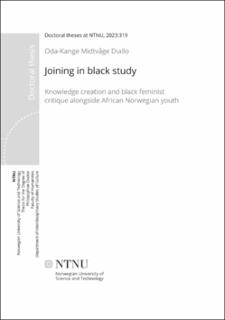| dc.description.abstract | Summary
This study is about blackness in Norway, and the implications of what I conceptualize as black study - a practice and analytical project that creates social change. The thesis includes four articles: two are co-authored with black feminist friends and colleagues and are based on collaborative autoethnography, and two are single authored and based primarily on conversations with study participants.
The thesis is a contribution to an underrepresented field, namely studies of blackness and the African diaspora in the Norway and the Nordics. It is a study of the implications of racialization that focuses on the second generation of African Norwegians, and how they seek to theorize from their experiences, create community and knowledge as well as develop a language to analyze the oppressive structures they face. I call these practices of theorizing, community making, and knowledge + language creation, black study.
By joining in black study, I uncover possibilities of practicing and developing situated black feminist methodologies on the margins of the Norwegian exceptionalist Academic Industrial Complex (Bachetta et al, 2018). Exploring the radical potential of black study as practice, I think with abolition and anticolonial anthropology (Shange, 2022). I invoke abolitionist Ruth Wilson Gilmore’s formulation of “noticing what people are already doing” (2022) as an entryway to thinking with, through and about black study in its different forms: from language creation to co-theorizing and counter-archiving (Haritaworn, Moussa and Ware, 2018). My understanding of study is inspired by Hammana and Klinkert’s concept of returning study to common use (2021). I keep black study practices at the forefront, viewing them as modes of learning and unlearning through a queer, black feminist lens. Blackness becomes a framework, within which there is room to maneuver. Fully embodying a black feminist epistemology has meant rethinking what a PhD project can do, as well as its limits. With black study being my central contribution, practice and meditation, my main method has simply been to join in black study with other African and black Norwegians by spending time in Oslo and online, wherever study takes place.
Thus, this thesis is both a methodological and a theoretical project, and in combination a project of queering and perhaps abolishing binaries, boundaries, and hierarchies between knowledge systems - data, method, theory - as it shifts, moves, glitches (Russel, 2020) towards envisioning a black feminist liberatory approach. In this thesis I show that such an approach is key to collaborative study of the workings of blackness and antiblackness in Norway and the Nordics. In other words, a black feminist liberatory approach is key to practicing and joining in black study.
Sammendrag
Denne studien handler om svarthet i Norge, og implikasjonene av det jeg konseptualiserer som black study - et metodologisk og analytisk prosjekt som skaper sosial endring. Avhandlingen inneholder fire artikler: to er skrevet i fellesskap med svarte feministiske venner og kolleger og er basert på samarbeidende autoetnografi. De andre to artiklene er skrevet av kandidaten alene og er hovedsakelig basert på samtaler med studiedeltakere.
Avhandlingen er et bidrag til et underrepresentert felt, nemlig studier av svarthet og den afrikanske diasporaen i Norge og Norden. Det er en studie av implikasjonene av rasialisering, som har andregenerasjonen av norskafrikanere i fokus. Jeg undersøker hvordan norskafrikanere søker å teoretisere fra sine erfaringer, skape fellesskap og kunnskap, samt utvikle et språk for å analysere de undertrykkende strukturene de møter. Black study innebærer altså disse praksisene av teoretisering, fellesskap-, kunnskap- og språkutvikling.
Ved å delta i black study avdekker jeg muligheter for å praktisere og utvikle situerte svarte feministiske metoder i utkanten av det jeg på engelsk kaller «Norwegian exceptionalist Academic Industrial Complex» (Bachetta et al, 2018). I min utforskning av det radikale potensialet i black study som praksis, tenker jeg med verktøyer fra abolisjonisme og antikolonial antropologi (Shange, 2022). Jeg gjør bruk av abolisjonisten Ruth Wilson Gilmores formulering om å «legge merke til hva folk allerede gjør» (2022) som en inngangsport til å tenke med, gjennom og om black study i sine ulike former: fra språkutvikling til samteoretisering og motarkivering (counter-archiving) (Haritaworn, Moussa og Ware, 2018). Min forståelse av study er inspirert av Hammana og Klinkerts konsept om å returnere studier til vanlig bruk (2021). Jeg holder svart studiepraksis i forkant, og ser på det som samtidig læring og avlæring gjennom et skeivt, svart feministisk perspektiv. Svarthet blir et rammeverk, der det finns handlingsrom. Å fullt ut kroppsliggjøre en svart feministisk epistemologi har betydd å revurdere hva et doktorgradsprosjekt kan gjøre, så vel som dets begrensninger. Med black study som mitt sentrale bidrag, praksis og meditasjon, har min hovedmetode rett og slett vært å delta i (uformelle) svarte studier med andre afrikanske og svarte nordmenn ved å tilbringe tid i Oslo og på sosiale medier, uansett hvor black study finner sted.
Dermed er denne avhandlingen både et metodologisk og et teoretisk prosjekt, og i kombinasjon et prosjekt for å queere (skeive) og muligvis avskaffe binære grenser og hierarkier mellom kunnskapssystemer - data, metode, teori - mens den skifter form, beveger seg, glitcher (hopper ut av sporet) (Russel, 2020) på vei mot å forestille seg en svart feministisk frigjørende metode. I avhandlingen viser jeg at en slik tilnærming er nøkkelen til samarbeidsstudier av hvordan svarthet og antisvarthet virker i Norge og Norden. Med andre ord, en svart feministisk frigjørende metode er nøkkelen til å praktisere og bli med på black study. | en_US |

